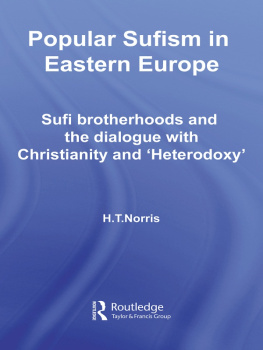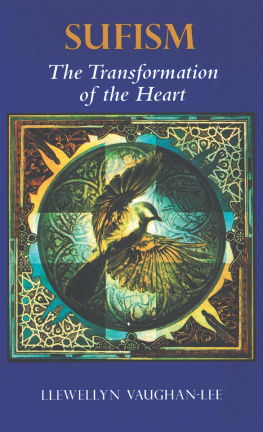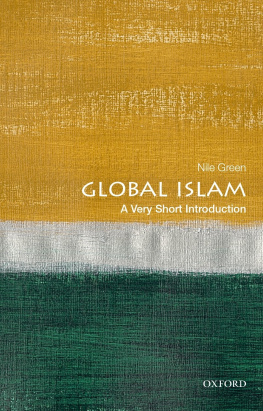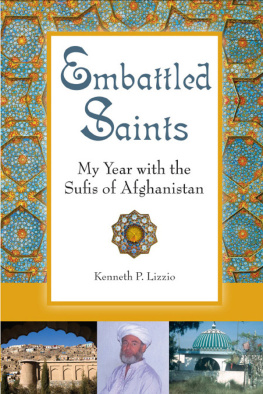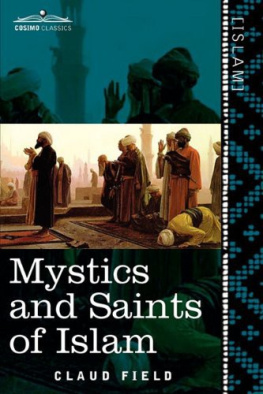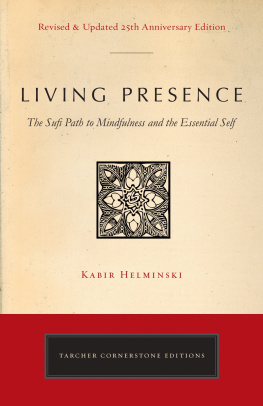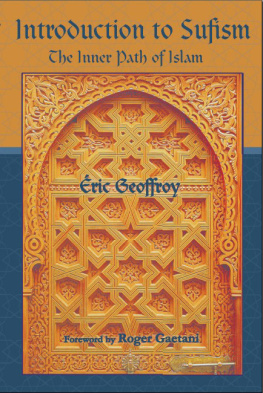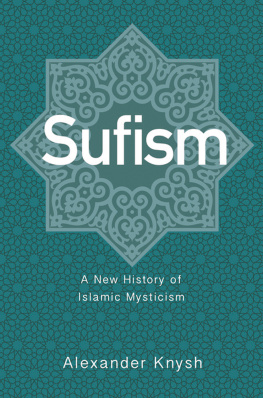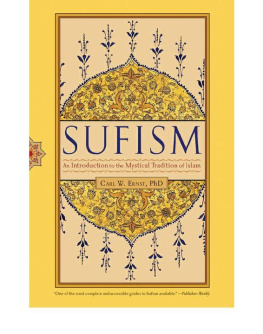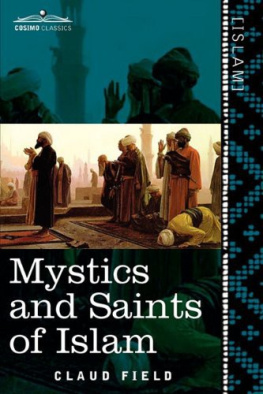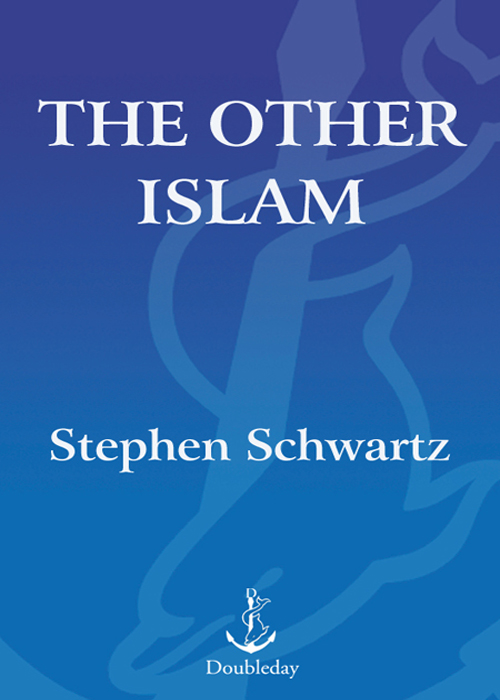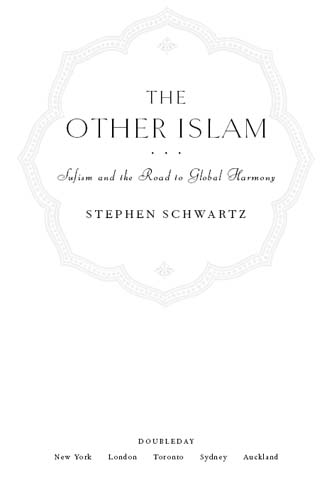Im Mohrenland gefangen war
Ein mdel hbsch und fein;
Sah rot und weiss, war schwarz von Haar,
Seufzt Tag und Nacht und weinte gar,
Wollt gern erlstet sein.
Da kam aus fremden Land daher
Ein junger Rittersmann;
Den jammerte das Mdchen dehr,
Juch! rief er, wag ich Kopf und Ehr,
Wenn ich sie retten kann.
In Moroccos land a captive lay
A maiden fair and fine.
With blushing skin, and night-black hair,
She sighed all day and night in hope
A rescuer she would find.
There came then from a foreign land
A young and noble knight;
He saw the tears shed in her plight.
Yes, he pledged, My honor and head
Ill risk, to her unbind.
The Abduction from the Seraglio;
Music by Mozart,
libretto by Christoph Friedrich Bretzner,
adapted by Gottlieb Stephanie the Younger,
translated by S.A.S.
INTRODUCTION
SufismIslamic Spirituality in a World of Fear
O N MAY 27, 2007, a huge bomb struck the mosque and shrine of Shaykh Abdul Qadri Jilani in central Baghdad, killing at least twenty-four people and injuring many more. The Jilani shrine is a prominent landmark in the Iraqi capital, and the explosion damaged its dome and minaret.
Shaykh Jilani, who lived from around 1077 to 1166 C.E.,1 has been described as a patron saint of Baghdad, and the celebration of his birthday, a custom known as mawlid in Islam, is a favorite festival in the city. His mawlid had taken place a month before the May 2007 blast.
Because Shaykh Jilani was a Sunni Muslim, some Westerners immediately assumed that the attack on his shrine was committed by Iraqi Shia Muslims. But they were wrong. The perpetrators of the Jilani bombing were also Sunnis. The difference was that Shaykh Jilani was known as a Sunni Sufi, and the bombers were Wahhabis (alias Salafis), probably from Saudi Arabia, who militantly claim the Sunni banner.
If the fighting between Muslims in Iraq pitted Sunnis against Shias, most Americans would ask, why would Sunnis bomb a Sunni shrine? Was this some bizarre provocation aimed at blaming Shias for the crime and rousing the anger of Sunnis? Every Muslim in the world knows the answer to that question: Sunnis attacked Sunnis in the Jilani shrine bombing because Wahhabis, representing the most extreme, violent, exclusionary, rigid, and fundamentalist interpretation in the history of Sunni Islamfueled by Saudi petrodollarsdespise Sufis and their shrines. Wahhabis also hate and kill other non-Wahhabi Sunnis, as well as Shias, Christians, Jews, Hindus, Buddhists, and anybody else with whom they disagree, including each other.
The rise of Al-Qaida and of Islamist terrorism in general originates more in Wahhabism and the divisions it has created within the community of Muslim believers than in a conflict with the West. And the field of deadly Wahhabi action against Sufis and other dissenting Muslims is not limited to Iraq. Less than five months after the Jilani shrine bomb, a blast at the shrine of another of the most famous Sufis, Moinuddin Chishti, in Ajmer, India, killed two people and injured twenty. The crime occurred during evening prayers when the shrine was crowded with hundreds of worshippers.
The conflict between Sufis, both Sunni and Shia, and Islamist fundamentalists or clericalists is widening around the worldin terror attacks striking Iraq as well as in reform efforts in Saudi Arabia, amid intrigues among American Muslims at the same time as Sunni fundamentalists and Sufis confront one another in the Balkans, and in the banning of Sufi books in Malaysia.
In November 2007, foreign press agencies reported on another and equally dramatic aspect of Sufism. In western Iran, many people were injured and more than a hundred were jailed when government security personnel stormed a meeting place for a Sufi group well known in the country, the Gonabadi-Nimatullahi order. An enraged mob of Shia Muslims attacked the Gonabadis in the town of Borujerd, following accusations that the mystics had desecrated a Shia mosque. Fighting left wounded on both sides, and in a piquant illustration of the ways in which Sufi spiritualists adapt to modernity, twenty-five motorcycles belonging to them were reported destroyed.
The Iranian clerical regime is in crisis, and Sufis are increasingly prominent as representatives of a new political and social alternative to the failed scheme of Ayatollah Ruhollah Khomeini (the story of the Gonabadi Sufis will be told in chapter 5). Similarly, Sufis are in the forefront of demands for political and social reform in Saudi Arabia, where the anti-Sufi Wahhabis comprise the official form of Islam. For many years the outstanding opponent of fundamentalism in Saudi Arabia was a beloved Sufi, Sayyid Muhammad Alawi Al-Maliki (19472004). When his funeral was held in Mecca, private jets choked Saudi airports for days.
In the Wahhabi mind, to praise a Sufi saint such as Shaykh Jilani, to observe his birthday, and to honor his shrine, is to deviate from strict monotheism, concentrated on God, and thus to treat a personality such as Jilani or Moinuddin Chishti as a partner or equal of God. According to the same bizarre logic, Wahhabis condemn mawlid birthday events for the Prophet Muhammad himself. The fundamentalists deride such customs as a mimicking of Christianity, claiming that extolling the Prophets birthday is an unacceptable innovation (bida) in religion and that Muslims must not stray from the original expression of their faith. That was the Wahhabi posture from the beginning: that acclaiming the Prophets birthday, Sufism itself (since it is not mentioned specifically in the Quran), and honoring Muslim and other saints are all novelties in Islam, to be strictly avoided.
But as Sayyid Al-Maliki and other opponents of Wahhabism have written, in texts appearing since Ottoman times, if Muslims reject all innovations after the era of the Prophet, they must abandon the written Quran (since Islamic scripture was delivered to Muhammad orally, and at first memorized), the production of books of knowledge, the erection of minarets at mosques, the construction of schools and hospitals, and numerous other modern customs, including use of sophisticated weaponry in war. Even the most extreme Wahhabis cannot claim to live by such a set of prescriptions, although they may impose them on others. Wahhabi fanatics will not watch television and the Saudi kingdom has no movie theaters, since both are recent inventions.
THE FAITH OF ISLAM continues to challenge Americans and other Westerners with many questions, which for most non-Muslims have remained unanswered. Is Islam a religion comparable to Christianity or Judaism, a political movement, or a violent conspiracy? Does it aim to conquer the world? Does it urge its adherents to commit atrocious acts of terror?








